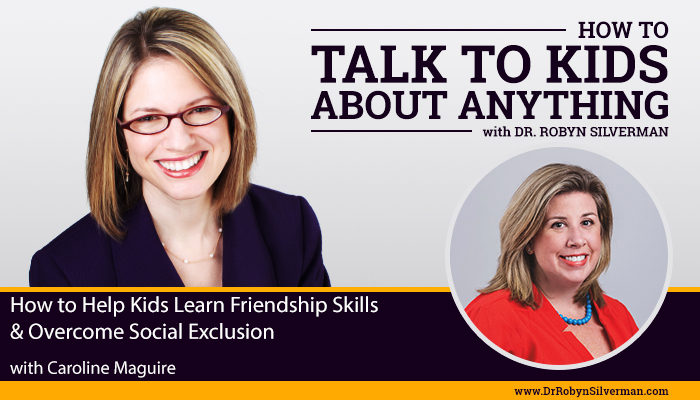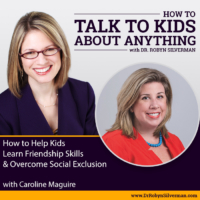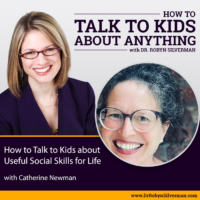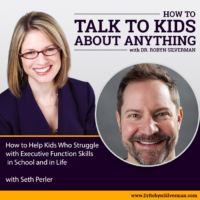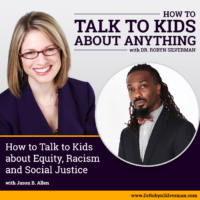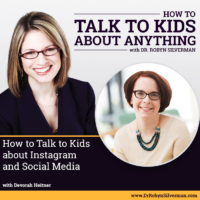Podcast: Play in new window | Download
Subscribe: Apple Podcasts | RSS | More
How to Help Kids Learn Friendship Skills and Avoid Social Isolation with Caroline Maguire
This podcast will focus on helping kids to gain needed friendships skills so that they can make and maintain meaningful relationships now and in the future. It will also serve to identify problematic behavior that may be keeping your children from making and being accepted by friends. Caroline Maguire, author of Why Will No One Play With Me provides tips and scripts that allow parents and educators to ask strong questions and provide necessary tools to help kids thrive in the area of friendship.
Special guest: Caroline Maguire
A child hangs back in gym class because he just knows he’ll be the last one picked. Another child monologues nonstop about dinosaurs on every playdate and still another talks nonstop throughout the movie even though everyone asks her to stop. They don’t get invited to birthday parties, are thought of too much or too little, & playdates often end poorly. Do you know any of these children? Every child struggles with something—and many have social challenges that, at their root, are issues with executive function and a need for social skills training. And while this may seem like just child’s play- those who know and love the children who struggle in the area of friendship know that it can be a very lonely place to be. The child often wants to have friends but isn’t picking up on social cues, the need to be flexible, and how to connect with same-age peers. They may ask, in one way or another, the heart-breaking question—Why Will No One Play With Me?
Caroline Maguire is a personal coach who works with children with ADHD and the families who support them. Caroline earned her ACCG (Advanced Level Certification) from the ADD Coach Academy and her PCC (Professional Certified Coach Certification) from the International Coach Federation (ICF). She also received a Master of Education from Lesley University. Her revolutionary coaching program and methodology helps teach executive function skills to children, teenagers, and young adults. She is a former coach for the Hallowell Center in Sudbury, MA. While with the Hallowell Center, Caroline was the main coach for children and teenagers. Caroline consults with schools and families internationally and has been co-leading social skills groups for over a decade. She is also the author of a NEW book called Why Will No One Play With Me? The Play Better Plan to Help Children of All Ages Make Friends & Thrive
The podcast provides:
- How to transform the “story” kids are telling themselves that may be keeping them from making and keeping friends.
- A way to identify what behaviors might be alienating others even when the child wants to make friends.
- How parents and educators can help strengthen the friendship skills of children in need.
- How to respond when a child asks; why will no one play with me?
- When (and which) incentives should be used?
- How to make a friendship “play better” plan.
- How to preplan before a playdate.
- What to do when your child is doing something off-putting during a playdate.
- How to debrief.
- Top tip for helping your child with friendship.
Important Messages:
- In social skills coaching and life- people attack the problem and tell kids what to do BUT instead we need to first
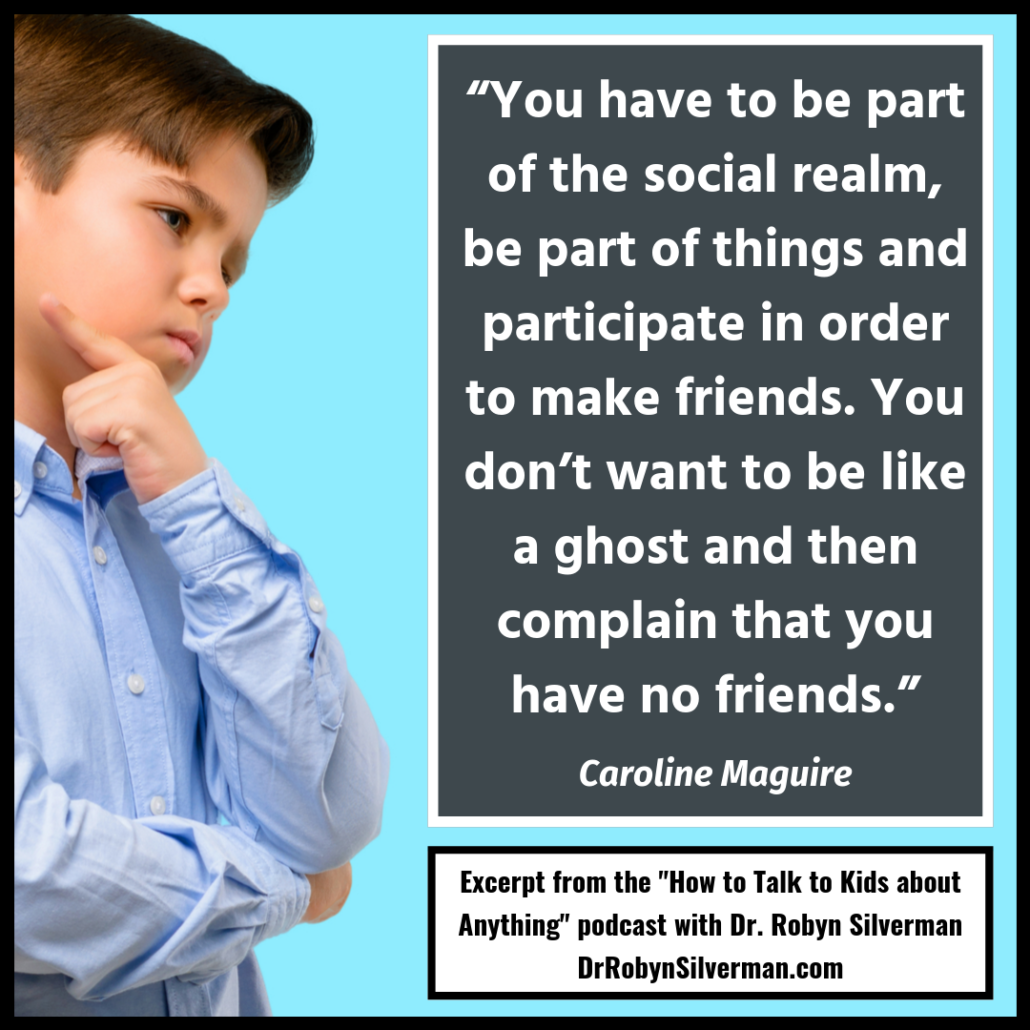 help kids change their internal story that they’ve been telling themselves (i.e. smart kids don’t need friends, nothing is going to work out, this is my mom’s problem but not a real problem). If they don’t buy in or think it needs to be changed, they won’t be on board to try. We need to ASK QUESTIONS to help our kids.
help kids change their internal story that they’ve been telling themselves (i.e. smart kids don’t need friends, nothing is going to work out, this is my mom’s problem but not a real problem). If they don’t buy in or think it needs to be changed, they won’t be on board to try. We need to ASK QUESTIONS to help our kids. - When you hear your child talk, what do they say about social? That’s what we need to address first.
- Move the dialogue along- start with a place of curiosity. You don’t need to have the perfect question- you can ask; “how come?” “Tell me more about that.” “What do you mean by that?” Don’t interrogate.
- Sit back and listen.
- Step into their shoes. Manage ourselves before we talk about things that make us upset.
- Must manage your past. Can be triggering when it comes to friendship.
- Siblings can be a great source of info. But don’t talk about this in front of the siblings.
- What are 4 words I should never say again? (i.e. calm down). What’s triggering?
- What makes it challenging to make friends? Not participating! Being the rule police. Not being adaptable. Correcting everyone. Being “too much” (too loud, joke goes on too long).
- People notice when kids are choosing behaviors that aren’t kind—if they are acting immature or talking behind someone’s back or a joke goes on too long or they are nagging their parent—people notice and they don’t like it! Potential friends might see this and they back away and don’t want to be that person’s friend.
- How do we walk in someone else’s shoes? What are friendship skills all about? Need to teach our kids. How do you do it?
- Are they quirky or are they alienating people?
- You just need to be social. You don’t have to like sports. BUT in order to be invited places, what is the minimum that you must do to be part of a group? That’s how you get friendly with people you want to be friendly with.
- Sometimes kids shut themselves out of something before they think “perhaps there is some good that can come out of this.”
- Talk to kids: Tell your kids about the things you do to have friends—that you might not want to do but you do because you want to have friends.
- Kids must have a place they love- but some things have to do.
- QUESTION: Think about the people you want to be friends with—what makes them enjoyable to be with? What do YOU need to do, minimum, to be part of that crowd? If you want to hang out with these people, what would it look like if you did ________? What would it mean to manage the situation? Play “soccer” once per week?
- Paving: (1) We want to have a conversation- spend time talking about getting help. Who are your go-to people? When do you reach out for help as a parent? Volunteer something that YOU need to work on that’s hard. (2) Have a few of these conversations- sometimes shorter. (3) Not in a bad mood. Not in front of siblings. Need to be receptive. (4) Soft way. What’s going on in friendship these days? What is something you want to change this year about friendship? You often tell me that you are unhappy and you want something change…I noticed that it’s been hard for you because we live in a sports town and you don’t play team sports- what would it be like to find your people? Start with the broader concept of friendship. (5) Stay neutral and detached. (whatever you hear, you are going to be okay with)
- Everybody is working on something! We always think the grass is greener.
- Strike a deal! You are leaving the comfort zone too, as a parent.
- Use the questionnaire- The Play Better Plan– in the book. If your kid is motivated by incentives- need to be willing to listen and try- in return you can earn points. What’s in it for me?
- Skill: Reading context, mood and energy. Some don’t pause to notice. EXERCISE: Go to a food court and watch people’s body signals when they are intense, in a bad mood. Or, do it in the family. What does mom do/say when she is at the end of her rope? How do you know when someone is in charge? How do you know when someone is bossy? How are people reacting? (otherize it and then equate it on themselves)
- If your kid is resistant- ask their advice. They might see themselves in what they are telling you and then start talking.
- EXERCISE: Social spy. Watch other people. Teach them NOT to watch directly. “Go to school and look at what other kids do in order to hang out with these people? When do they get up, when do they get in, where do they go?” They make the discovery on their own!
- WHAT TO DO: When your child is doing something off-putting in the moment. Preplan. (1) Have a practice playdate with a cousin. (2) Have a mission (i.e. to let the other person choose the movie). (3) Have a cue- hey do you want popcorn? Tap on shoulder. In place of “hey, you are being bossy.” Don’t intervene. As early as 5 or 6, you don’t want to intervene because it will backfire.
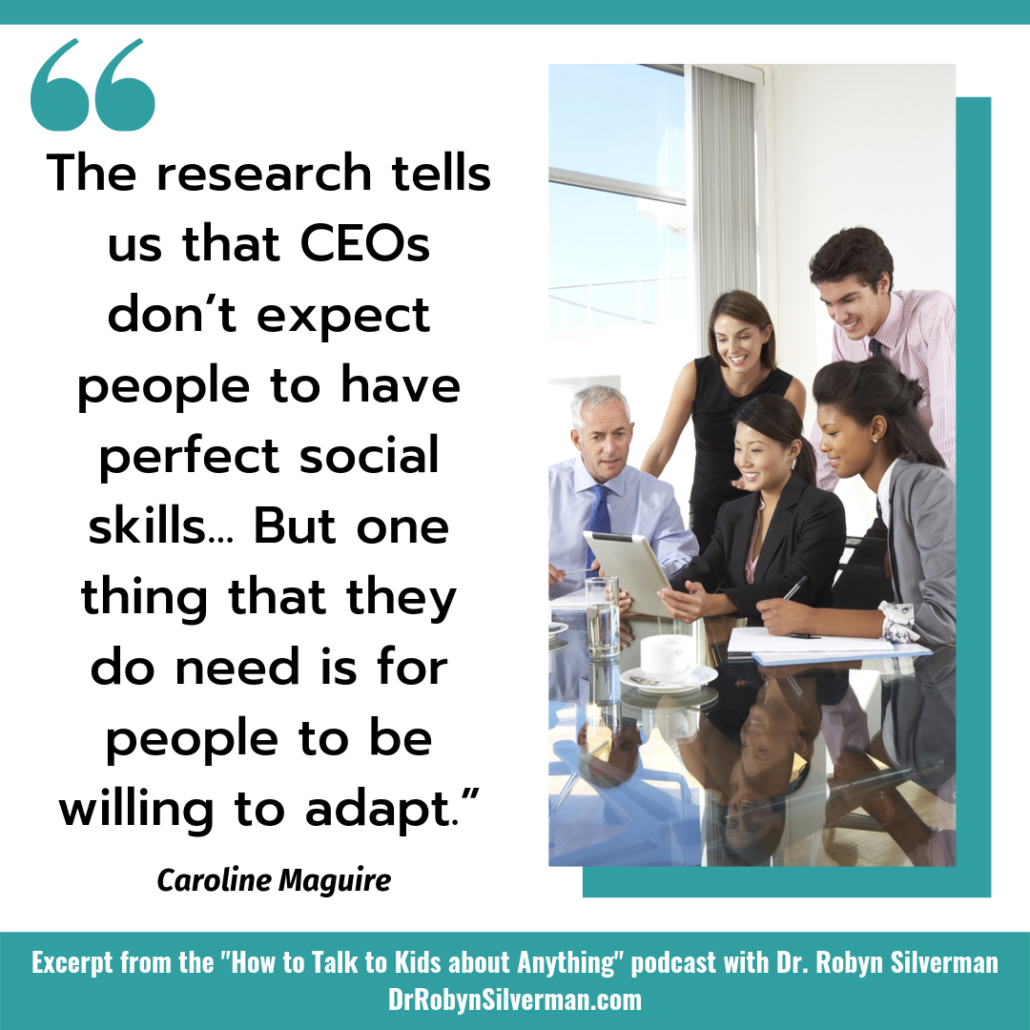 DEBRIEF: Talk about the wins. “I saw you show kindness.” “I noticed you were great about sharing in the first 15 min.” “I noticed you worked hard on your mission.” And even if the intention is there but the result is not what was intended, compliment the trying. Discuss what to do next time. You can role play. Ask; “what happened” during a particular situation. You might not know the full circumstance. Some children might not know how to handle certain situations. Then plan for next time.
DEBRIEF: Talk about the wins. “I saw you show kindness.” “I noticed you were great about sharing in the first 15 min.” “I noticed you worked hard on your mission.” And even if the intention is there but the result is not what was intended, compliment the trying. Discuss what to do next time. You can role play. Ask; “what happened” during a particular situation. You might not know the full circumstance. Some children might not know how to handle certain situations. Then plan for next time.- DEBRIEF: Was the playdate too long? Was it a playmate we can work with effectively? Better at home? Better out of the house? Bounce house too much for them?
- Finish this sentence: The most important thing that kids need to know about playing better and making friends is: TO BE ADAPTIVE.
- Research- CEO- don’t expect kids to have perfect social skills. But one thing that they do need is for people to be willing to adapt. Don’t need the right thing to say all the time- but don’t argue with everyone.
- Top tip: Ask questions and listen to what they are struggling with—and then help them to solve the issues.
- Myth: “I think people should come to me.” That’s not how life works! Put yourself out there and go to the people you are interested in becoming friends with at this point in time.
Notable Quotables:
- “When talking to your kids about negative stories they are telling themselves, start with curiosity. Ask; ‘how
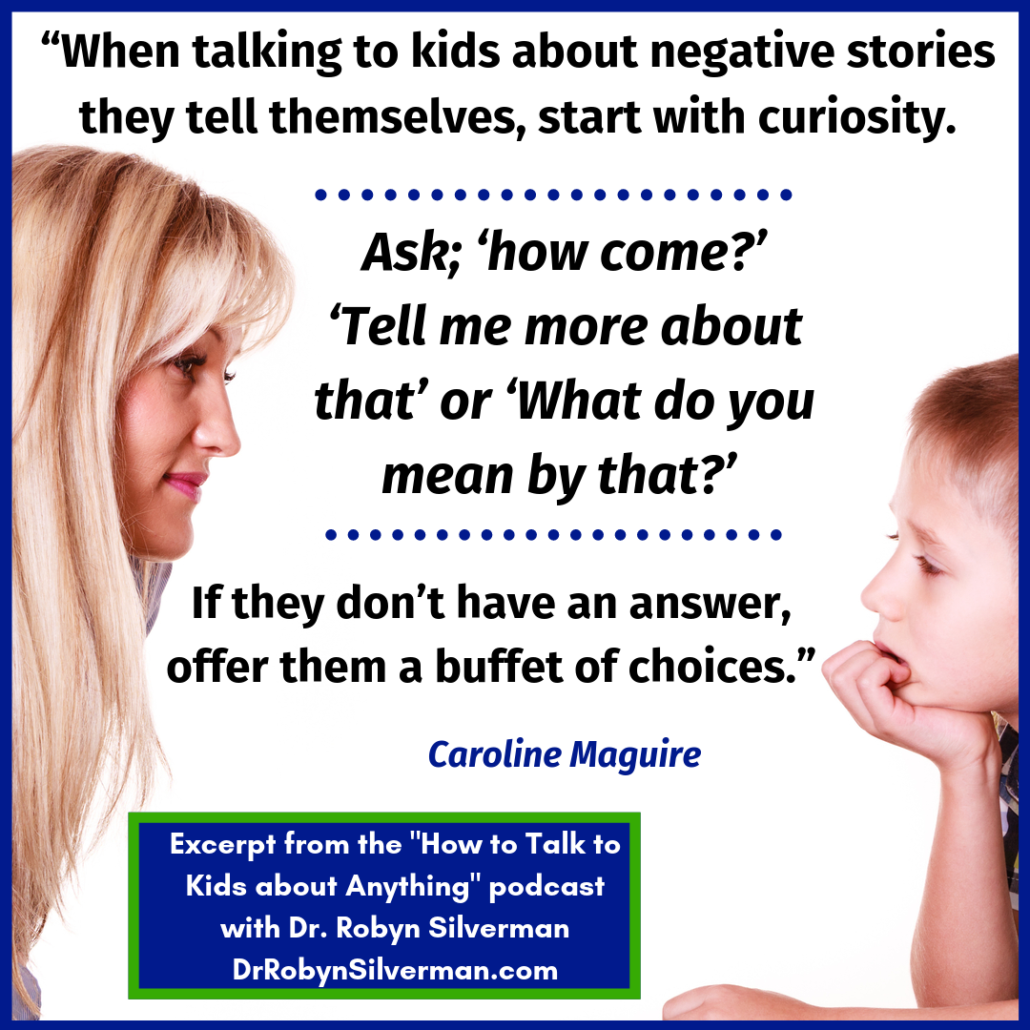 come?’ ‘Tell me more about that’ or ‘What do you mean by that?’ And if they don’t have an answer, you can offer them a buffet of choices.”
come?’ ‘Tell me more about that’ or ‘What do you mean by that?’ And if they don’t have an answer, you can offer them a buffet of choices.” - “When talking with kids, start from a place of curiosity. Don’t assume you know the answer. First ask, don’t tell.”
- “What we are trying to do is make our kids into their best selves. We want to make it so that they have choices.”
- “You have to be part of the social realm, be part of things and participate in order to make friends. You don’t want to be like a ghost and then complain you have no friends.”
- “Everything we do, other people notice. If you are nagging your mom in the middle of the hockey waiting room, your friends notice…and they don’t love it. If you are bossing people around constantly, people back away.”
- “Everybody can find a group of people like you and want what you want. As long as you find your people, you’re okay. Even the quirkiest kid should be able to find a group of people who are like them and who like them.”
- Dr. Robyn quote: “We can help our kids with friendship struggles but if we are so entangled in what our child says, how our child reacts or what happens next, then our ability to be helpful becomes compromised.”
- “We need to teach our kids that when you read the room, you don’t only pick up on what people say but you also pick up on people’s energy—their vibe. But many kids don’t pick up on people’s vibe!”
- “If kids seem resistant to talking about their challenges, ask their advice! Then, they might admit, ‘that’s kind of like me’ and start talking. At that point, they are like a deer—don’t look to close, don’t get too close because the deep will run away.”
- “It’s our goal for our children’s social—that they have friends, they are able to grow up and have relationships and they can make choices in the workplace—they don’t have to stay in the same job because they don’t know how to navigate.”
- “The research tells us that CEOs don’t expect people to have perfect social skills. As a matter of fact, especially in the tech sector, they don’t expect it at all. But one thing that they do need is for people to be willing to adapt.”
- As parents, sometimes, we look at our kid and think, ‘wow, for them these social skills are such a struggle. I can’t imagine them transforming into someone else. We’re not doing that. We are trying to make them into their best selves.”

